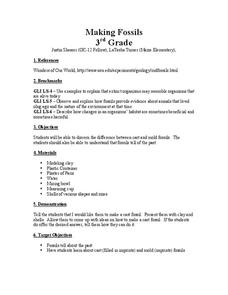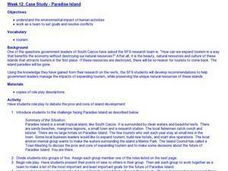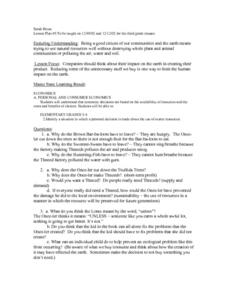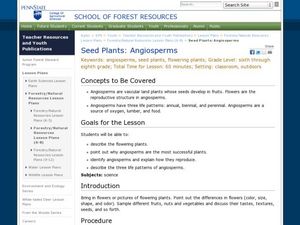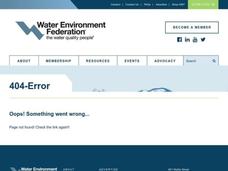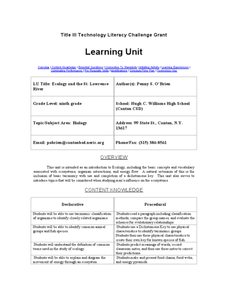Curated OER
What If We Run Out?
Students explore the consequences of shrinking habitats and the human impact on wildlife populations. They participate in a game to study the consequences and describe the preservation of animal habitats.
Curated OER
Making Fossils
Third graders examine the differences between cast and mold fossils. They discuss geological time and how many fossils are millions of years old, then create a cast fossil using clay and a shell, and a mold fossil using a shell and...
Curated OER
Greenhouse Gas Lab
Learners compare the ability of a sample of carbon dioxide gas to
absorb thermal energy compared to a sample of air. They build a visual representation of the greenhouse effect to illustrate the heat-absorption of
atmospheric carbon...
Curated OER
Fish Swimming--A Poem by Moniza Alvi
In this poetry analysis worksheet, students read the poem "Fish Swimming," and discuss the metaphors in the poem. Students complete eight activities based on the poem, including rewriting the subject of the poem and watching two...
Curated OER
Insect Food Chain & Camouflage
Students use art work to demonstrate their understanding of the insect food chain and their ability to camouflage themselves. In this insect food chain and camouflage lesson, students determine what type of animals feed on insects. They...
Curated OER
Case Study - Paradise Island
Students make a plan for the future of Paradise Island. Their recommendations should help government leaders manage the impacts of expanding tourism, while preserving the unique natural resources of this island.
Curated OER
Around the World
Students explore ways people from around the world are like them. They discuss how geography affects the way people live and work and how culture affects a person's day to day life. Students give a presentation over a chosen country to...
Curated OER
How Does a Seed Grow Into a Plant?
Second graders explore how seeds grow into plants. They discuss types of seeds and place seeds in wet paper towels to germinate. They draw a picture in their journal to record their observations for four days. They take pictures of their...
Curated OER
Economics -- Third Grade
Third graders read the Dr. Seuss book The Lorax. In groups, they answer questions that are related to economics and distribution of goods. They also identify the environmental issues present in the book and perform a skit in front of the...
Curated OER
Forests of the World
For this forests worksheet, students read a one page informational excerpt on different forests throughout the world. They then use what they learned to answer the 20 questions on the worksheet. The answers are on the last page of the...
Curated OER
Ice Energy
Students learn how science affects foods. In this chemical reactions lesson, students make two kinds of ice cream. They evaluate the different changes based on the ingredients.
Curated OER
Seed Plants: Angiosperms
Students describe flowering plants and see why angiosperms are the most successful plants. In this angiosperms lesson students identify angiosperms and explain how they reproduce.
Curated OER
Unit 5 - Food
Students study the biodiversity existing in the Amazon rainforest. In this Amazon biodiversity lesson, students study diagrams, maps, and information about the biodiversity in the Amazon.
Curated OER
Is Urban Sprawl Causing Us To Lose More Than Ground?
Students map the changes that occur in the land as a result of urban sprawl. They explore the problems that paving and building have on the watershed and the habitats on the Northshore.
Curated OER
Positively Paper
Students discover that all paper is recycled the same way, and that some paper requires complex chemical treatments before it can be made into usable recycled paper. They see that we must choose what kinds of paper minimize environmental...
Curated OER
Biography of a River
Students examine the development and history of various rivers in their state and conduct research about a specific river. They read and discuss a handout, and complete a river biography that includes birth information, location and...
Curated OER
Toxicology and Living Systems
Learners investigate how toxic chemicals affect biological systems. They determine the toxic dose of a chemical that inhibits seed germination in a Brassica rapa. They investigate the effect of environmental tobacco smoke on human lung...
Curated OER
Positively Paper
Students study concepts related to paper recycling. In this recycling lesson, they investigate the chemical processes used to recycle paper, and look at the environmental problems associated with using and recycling different types of...
Curated OER
Ecology and the St. Lawrence River
Ninth graders complete a unit of lessons on ecosystems, organism interactions, and energy flow. They create a key for known species of fish, diagram the movement of energy through an ecosystem, and create and present food chains and food...
Curated OER
Populations and Ecosystems
Sixth graders examine the factors that influence the stability of ecosystems. They construct a miniature ecosystem in a jar that includes plants, small fish, and snails, record the population changes over a period of four weeks, and...
Curated OER
What is Energy?
Students define energy and identify the different types that exist. They identify places they see, hear or feel energy. They understand the role of engineering in finding and testing sources of energy for the production of electricity.
Curated OER
Nest Watch
Pupils describe the nests of three common birds. They build a specific type of bird nest, using the same materials a bird would use. Students build a nest platform to attract a nesting pair of osprey. They observe, record, and submit...
Curated OER
Sustainability
Fifth graders investigate the concept of natural resources. They participate in a simulation project to see possible uses. They use the internet to study how Hacienda Verde is used as a model for others for sustainable coffee crops.
Curated OER
Exploring Ecosystems
Fourth graders create an ecosystem as a class. They have already produced smaller ones. They use a pond or something similar on school grounds to meet the needs of certain plants and animals of their ecosystem. Specifically created will...



